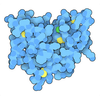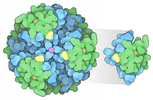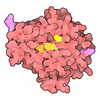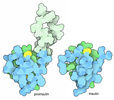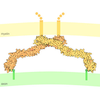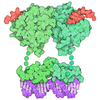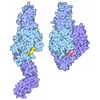+ Open data
Open data
- Basic information
Basic information
| Entry | Database: PDB / ID: 8pr1 | ||||||||||||
|---|---|---|---|---|---|---|---|---|---|---|---|---|---|
| Title | Cytoplasmic dynein-B heavy chain bound to IC-LC tower | ||||||||||||
 Components Components |
| ||||||||||||
 Keywords Keywords | MOTOR PROTEIN / Dynein / AAA-Atpase / LC8 / TCTEX1 | ||||||||||||
| Function / homology |  Function and homology information Function and homology informationintracellular transport of viral protein in host cell / nitric-oxide synthase inhibitor activity / deoxyribonuclease inhibitor activity / negative regulation of DNA strand resection involved in replication fork processing / secretory vesicle / negative regulation of phosphorylation / intraciliary retrograde transport / visual behavior / transport along microtubule / dynein light chain binding ...intracellular transport of viral protein in host cell / nitric-oxide synthase inhibitor activity / deoxyribonuclease inhibitor activity / negative regulation of DNA strand resection involved in replication fork processing / secretory vesicle / negative regulation of phosphorylation / intraciliary retrograde transport / visual behavior / transport along microtubule / dynein light chain binding / dynein heavy chain binding / Activation of BIM and translocation to mitochondria / motile cilium assembly / Intraflagellar transport / positive regulation of intracellular transport / negative regulation of nitric oxide biosynthetic process / regulation of metaphase plate congression / positive regulation of spindle assembly / establishment of spindle localization / regulation of G protein-coupled receptor signaling pathway / microtubule-dependent intracellular transport of viral material towards nucleus / dynein complex / COPI-independent Golgi-to-ER retrograde traffic / retrograde axonal transport / P-body assembly / microtubule motor activity / minus-end-directed microtubule motor activity / centrosome localization / dynein light intermediate chain binding / cytoplasmic dynein complex / microtubule-based movement / nuclear migration / Macroautophagy / ciliary tip / dynein intermediate chain binding / establishment of mitotic spindle orientation / tertiary granule membrane / ficolin-1-rich granule membrane / spermatid development / positive regulation of insulin secretion involved in cellular response to glucose stimulus / COPI-mediated anterograde transport / cytoplasmic microtubule / cytoplasmic microtubule organization / axon cytoplasm / Amplification of signal from unattached kinetochores via a MAD2 inhibitory signal / Loss of Nlp from mitotic centrosomes / Loss of proteins required for interphase microtubule organization from the centrosome / Recruitment of mitotic centrosome proteins and complexes / MHC class II antigen presentation / Mitotic Prometaphase / substantia nigra development / Recruitment of NuMA to mitotic centrosomes / enzyme inhibitor activity / Anchoring of the basal body to the plasma membrane / EML4 and NUDC in mitotic spindle formation / stress granule assembly / HSP90 chaperone cycle for steroid hormone receptors (SHR) in the presence of ligand / AURKA Activation by TPX2 / regulation of mitotic spindle organization / Resolution of Sister Chromatid Cohesion / mitotic spindle organization / filopodium / RHO GTPases Activate Formins / cellular response to nerve growth factor stimulus / negative regulation of neurogenesis / kinetochore / microtubule cytoskeleton organization / spindle / HCMV Early Events / Aggrephagy / azurophil granule lumen / mitotic spindle / Separation of Sister Chromatids / Regulation of PLK1 Activity at G2/M Transition / late endosome / nervous system development / host cell / positive regulation of cold-induced thermogenesis / site of double-strand break / scaffold protein binding / secretory granule lumen / cell cortex / vesicle / ficolin-1-rich granule lumen / microtubule / cytoskeleton / cilium / cell division / apoptotic process / DNA damage response / Neutrophil degranulation / symbiont entry into host cell / centrosome / protein-containing complex binding / enzyme binding / Golgi apparatus / ATP hydrolysis activity / mitochondrion / RNA binding / extracellular exosome Similarity search - Function | ||||||||||||
| Biological species |  Homo sapiens (human) Homo sapiens (human) | ||||||||||||
| Method | ELECTRON MICROSCOPY / single particle reconstruction / cryo EM / Resolution: 8.2 Å | ||||||||||||
 Authors Authors | Singh, K. / Lau, C.K. / Manigrasso, G. / Gassmann, R. / Carter, A.P. | ||||||||||||
| Funding support |  United Kingdom, European Union, 3items United Kingdom, European Union, 3items
| ||||||||||||
 Citation Citation |  Journal: Science / Year: 2024 Journal: Science / Year: 2024Title: Molecular mechanism of dynein-dynactin complex assembly by LIS1. Authors: Kashish Singh / Clinton K Lau / Giulia Manigrasso / José B Gama / Reto Gassmann / Andrew P Carter /   Abstract: Cytoplasmic dynein is a microtubule motor vital for cellular organization and division. It functions as a ~4-megadalton complex containing its cofactor dynactin and a cargo-specific coiled-coil ...Cytoplasmic dynein is a microtubule motor vital for cellular organization and division. It functions as a ~4-megadalton complex containing its cofactor dynactin and a cargo-specific coiled-coil adaptor. However, how dynein and dynactin recognize diverse adaptors, how they interact with each other during complex formation, and the role of critical regulators such as lissencephaly-1 (LIS1) protein (LIS1) remain unclear. In this study, we determined the cryo-electron microscopy structure of dynein-dynactin on microtubules with LIS1 and the lysosomal adaptor JIP3. This structure reveals the molecular basis of interactions occurring during dynein activation. We show how JIP3 activates dynein despite its atypical architecture. Unexpectedly, LIS1 binds dynactin's p150 subunit, tethering it along the length of dynein. Our data suggest that LIS1 and p150 constrain dynein-dynactin to ensure efficient complex formation. | ||||||||||||
| History |
|
- Structure visualization
Structure visualization
| Structure viewer | Molecule:  Molmil Molmil Jmol/JSmol Jmol/JSmol |
|---|
- Downloads & links
Downloads & links
- Download
Download
| PDBx/mmCIF format |  8pr1.cif.gz 8pr1.cif.gz | 652.2 KB | Display |  PDBx/mmCIF format PDBx/mmCIF format |
|---|---|---|---|---|
| PDB format |  pdb8pr1.ent.gz pdb8pr1.ent.gz | Display |  PDB format PDB format | |
| PDBx/mmJSON format |  8pr1.json.gz 8pr1.json.gz | Tree view |  PDBx/mmJSON format PDBx/mmJSON format | |
| Others |  Other downloads Other downloads |
-Validation report
| Arichive directory |  https://data.pdbj.org/pub/pdb/validation_reports/pr/8pr1 https://data.pdbj.org/pub/pdb/validation_reports/pr/8pr1 ftp://data.pdbj.org/pub/pdb/validation_reports/pr/8pr1 ftp://data.pdbj.org/pub/pdb/validation_reports/pr/8pr1 | HTTPS FTP |
|---|
-Related structure data
| Related structure data |  17831MC  8pqvC 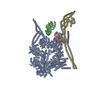 8pqwC  8pqyC 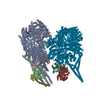 8pqzC  8pr0C 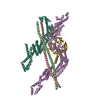 8pr2C  8pr3C  8pr4C 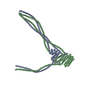 8pr5C  8ptkC M: map data used to model this data C: citing same article ( |
|---|---|
| Similar structure data | Similarity search - Function & homology  F&H Search F&H Search |
- Links
Links
- Assembly
Assembly
| Deposited unit | 
|
|---|---|
| 1 |
|
- Components
Components
-Dynein light chain ... , 3 types, 6 molecules DEKLts
| #1: Protein | Mass: 10381.899 Da / Num. of mol.: 2 Source method: isolated from a genetically manipulated source Source: (gene. exp.)  Homo sapiens (human) / Gene: DYNLL1, DLC1, DNCL1, DNCLC1, HDLC1 / Production host: Homo sapiens (human) / Gene: DYNLL1, DLC1, DNCL1, DNCLC1, HDLC1 / Production host:  #3: Protein | Mass: 12461.996 Da / Num. of mol.: 2 Source method: isolated from a genetically manipulated source Source: (gene. exp.)  Homo sapiens (human) / Gene: DYNLT1 / Production host: Homo sapiens (human) / Gene: DYNLT1 / Production host:  #6: Protein | Mass: 10934.576 Da / Num. of mol.: 2 Source method: isolated from a genetically manipulated source Source: (gene. exp.)  Homo sapiens (human) / Gene: DYNLRB1, BITH, DNCL2A, DNLC2A, ROBLD1, HSPC162 / Production host: Homo sapiens (human) / Gene: DYNLRB1, BITH, DNCL2A, DNLC2A, ROBLD1, HSPC162 / Production host:  |
|---|
-Cytoplasmic dynein 1 ... , 3 types, 6 molecules IJAGFH
| #2: Protein | Mass: 68442.141 Da / Num. of mol.: 2 Source method: isolated from a genetically manipulated source Source: (gene. exp.)  Homo sapiens (human) / Gene: DYNC1I2, DNCI2, DNCIC2 / Production host: Homo sapiens (human) / Gene: DYNC1I2, DNCI2, DNCIC2 / Production host:  #4: Protein | Mass: 533055.125 Da / Num. of mol.: 2 / Mutation: R1567E, K1610E Source method: isolated from a genetically manipulated source Source: (gene. exp.)  Homo sapiens (human) / Gene: DYNC1H1, DHC1, DNCH1, DNCL, DNECL, DYHC, KIAA0325 / Production host: Homo sapiens (human) / Gene: DYNC1H1, DHC1, DNCH1, DNCL, DNECL, DYHC, KIAA0325 / Production host:  #5: Protein | Mass: 54173.156 Da / Num. of mol.: 2 Source method: isolated from a genetically manipulated source Source: (gene. exp.)  Homo sapiens (human) / Gene: DYNC1LI2, DNCLI2, LIC2 / Production host: Homo sapiens (human) / Gene: DYNC1LI2, DNCLI2, LIC2 / Production host:  |
|---|
-Experimental details
-Experiment
| Experiment | Method: ELECTRON MICROSCOPY |
|---|---|
| EM experiment | Aggregation state: PARTICLE / 3D reconstruction method: single particle reconstruction |
- Sample preparation
Sample preparation
| Component | Name: Cytoplasmic dynein-A heavy chain bound to dynactin p150 and IC-LC tower Type: COMPLEX / Entity ID: #1-#5 / Source: RECOMBINANT |
|---|---|
| Source (natural) | Organism:  Homo sapiens (human) Homo sapiens (human) |
| Source (recombinant) | Organism:  |
| Buffer solution | pH: 7.2 |
| Specimen | Embedding applied: NO / Shadowing applied: NO / Staining applied: NO / Vitrification applied: YES |
| Vitrification | Cryogen name: ETHANE |
- Electron microscopy imaging
Electron microscopy imaging
| Experimental equipment |  Model: Titan Krios / Image courtesy: FEI Company |
|---|---|
| Microscopy | Model: FEI TITAN KRIOS |
| Electron gun | Electron source:  FIELD EMISSION GUN / Accelerating voltage: 300 kV / Illumination mode: FLOOD BEAM FIELD EMISSION GUN / Accelerating voltage: 300 kV / Illumination mode: FLOOD BEAM |
| Electron lens | Mode: BRIGHT FIELD / Nominal defocus max: 4000 nm / Nominal defocus min: 500 nm |
| Image recording | Electron dose: 53 e/Å2 / Film or detector model: GATAN K3 BIOQUANTUM (6k x 4k) |
- Processing
Processing
| EM software |
| ||||||||||||
|---|---|---|---|---|---|---|---|---|---|---|---|---|---|
| CTF correction | Type: PHASE FLIPPING AND AMPLITUDE CORRECTION | ||||||||||||
| 3D reconstruction | Resolution: 8.2 Å / Resolution method: FSC 0.143 CUT-OFF / Num. of particles: 42405 / Symmetry type: POINT | ||||||||||||
| Atomic model building | PDB-ID: 7Z8G Accession code: 7Z8G / Source name: PDB / Type: experimental model |
 Movie
Movie Controller
Controller














 PDBj
PDBj

